牛津译林版8B Unit3 Online tours复习课件
文档属性
| 名称 | 牛津译林版8B Unit3 Online tours复习课件 |

|
|
| 格式 | zip | ||
| 文件大小 | 549.2KB | ||
| 资源类型 | 教案 | ||
| 版本资源 | 牛津译林版 | ||
| 科目 | 英语 | ||
| 更新时间 | 2014-04-14 00:00:00 | ||
图片预览

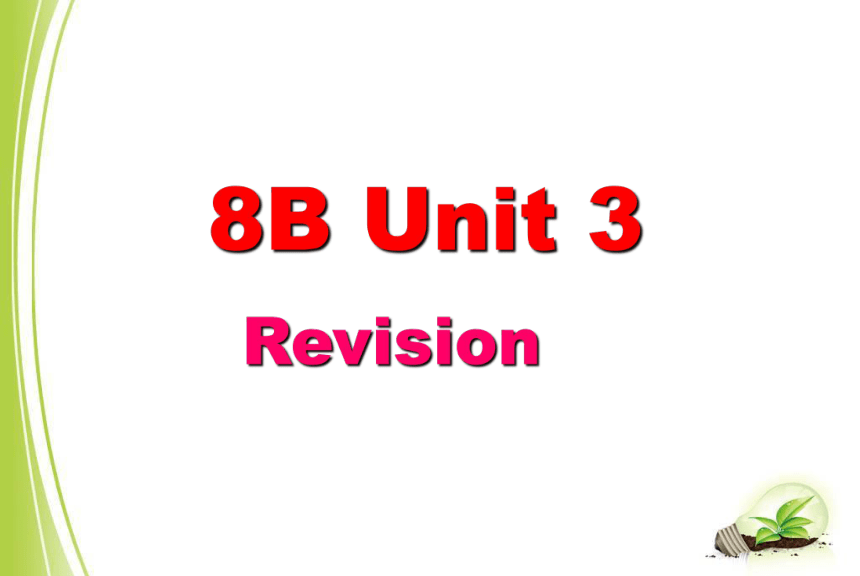

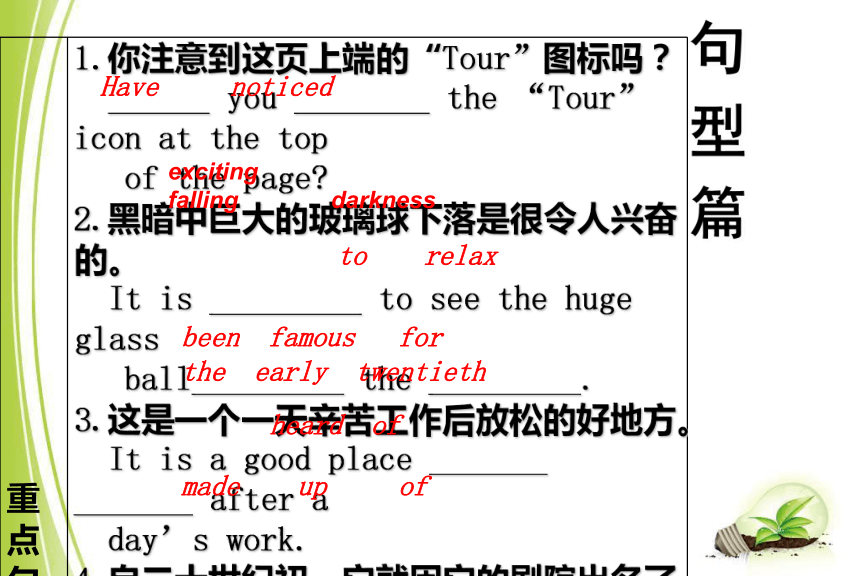
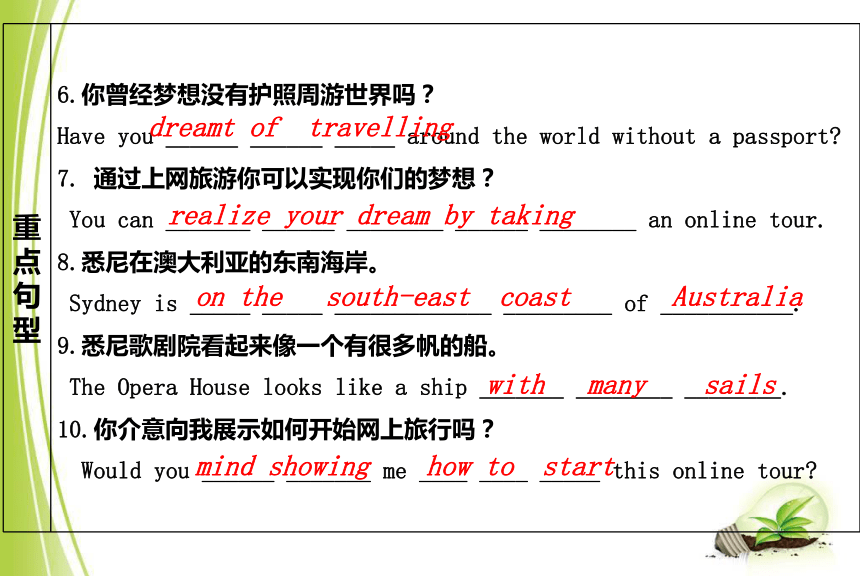


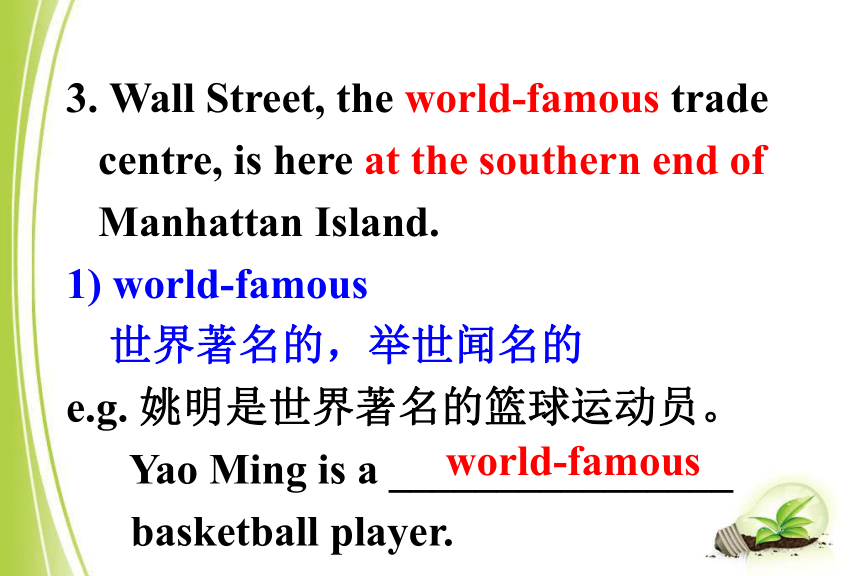
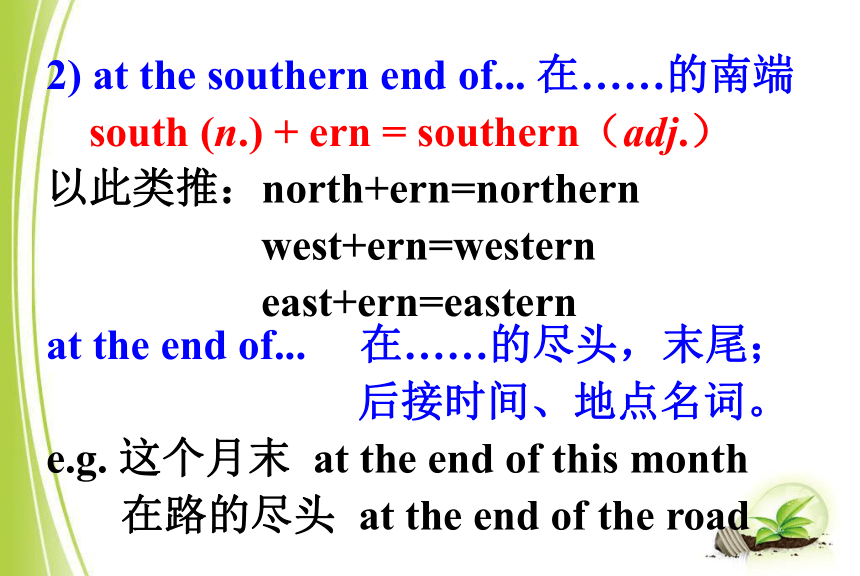
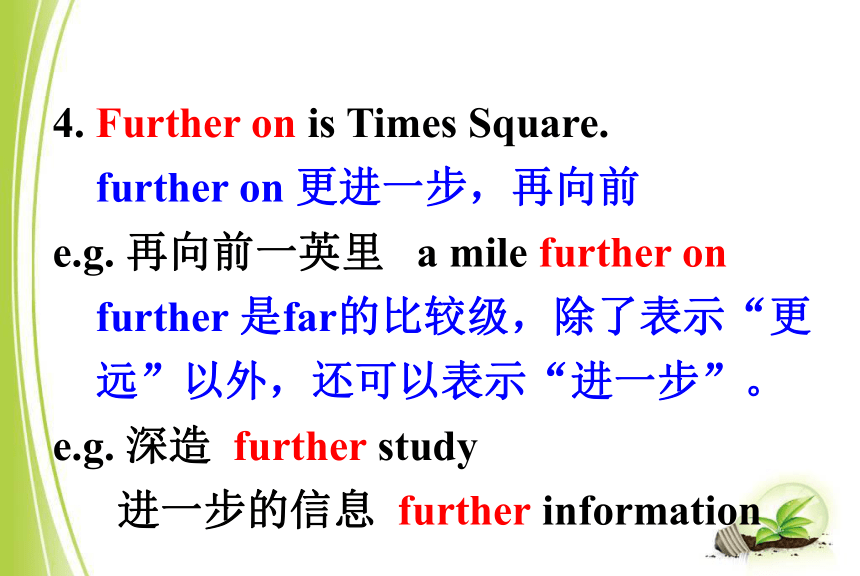
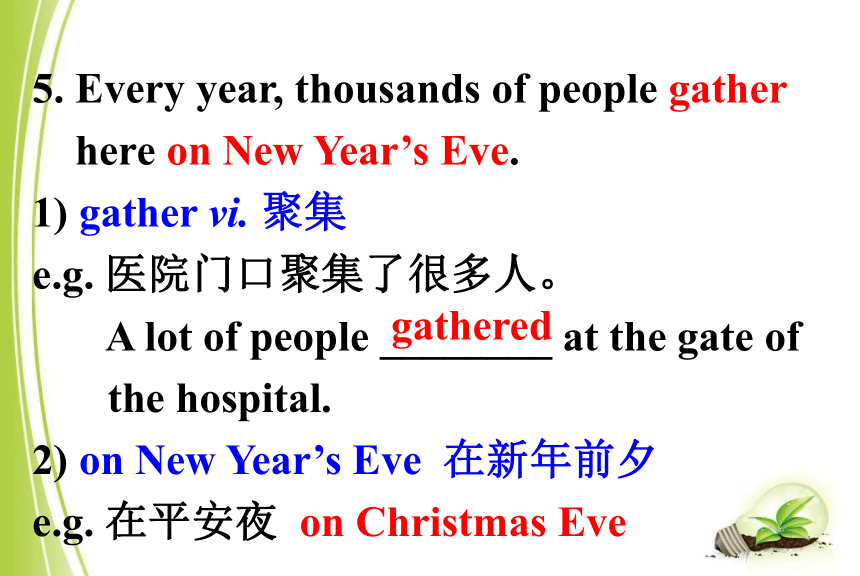
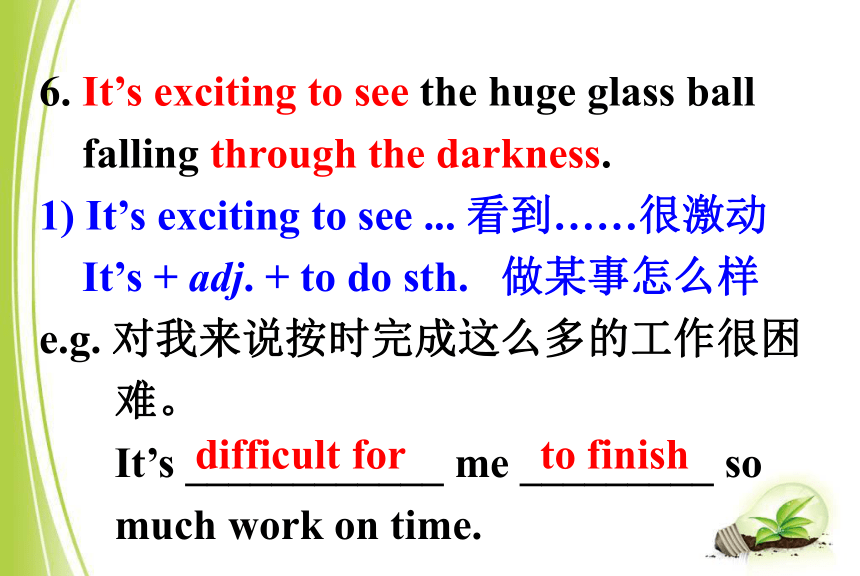
文档简介
课件53张PPT。Revision8B Unit 3短语篇1. 网上旅行 Online tours
2. 换频道 change the channel
3. 遥控器 the remote control
4. 了解全世界的名胜
learn about places of interest around the world
5. 在网络或图书馆的帮助下
with the help of the Internet or libraries
6. 用……做……use sth… to do/ use sth. for sth.
7. 做文字处理 do word processing
8. 搜索信息 search for the information
9. 发送和接收电子邮件 send and receive emails
10. 看录像 watch videos 句
型
篇Have noticedexciting
falling darknessto relaxbeen famous for
the early twentiethheard ofmade up ofdreamt of travellingrealize your dream by takingon the south-east coast Australiawith many sailsmind showing how to start Have you noticed the “Tour” icon at
the top of the page?
at the top of ... 在……的顶部
e.g. 山上有座塔。
There is a tower ____________ the
hill.at the top ofLanguage points2. Just click on it, and you can visit Asia, Africa,…
click on... 点击……
e.g. 点击这个图标。
_________ this icon.Click on3. Wall Street, the world-famous trade centre, is here at the southern end of Manhattan Island.
world-famous
世界著名的,举世闻名的
e.g. 姚明是世界著名的篮球运动员。
Yao Ming is a ________________
basketball player.world-famous2) at the southern end of... 在……的南端
south (n.) + ern = southern(adj.)
以此类推:north+ern=northern
west+ern=western
east+ern=easternat the end of... 在……的尽头,末尾;
后接时间、地点名词。
e.g. 这个月末 at the end of this month
在路的尽头 at the end of the road4. Further on is Times Square.
further on 更进一步,再向前
e.g. 再向前一英里 a mile further on
further 是far的比较级,除了表示“更
远”以外,还可以表示“进一步”。
e.g. 深造 further study
进一步的信息 further information5. Every year, thousands of people gather
here on New Year’s Eve.
1) gather vi. 聚集
e.g. 医院门口聚集了很多人。
A lot of people ________ at the gate of
the hospital.
2) on New Year’s Eve 在新年前夕
e.g. 在平安夜 on Christmas Evegathered6. It’s exciting to see the huge glass ball
falling through the darkness.
1) It’s exciting to see ... 看到……很激动
It’s + adj. + to do sth. 做某事怎么样
e.g. 对我来说按时完成这么多的工作很困
难。
It’s ____________ me _________ so
much work on time.difficult forto finish 2) see sb. doing 看见某人正在做某事
e.g. 我刚才看见很多孩子在操场上打篮球。
I ______ many children _________
basketball on the playground just now.saw playing感官动词
see,?watch,?observe,?notice,?look?at,?
hear,?listen?to,?smell,?taste,?feel?+?do??表示动作的完整性,真实性;+doing?表示动作的连续性,进行性。3) through the darkness 穿过黑暗
through 意为“穿过”,通常指从物体
或事物的“内部”穿过。
e.g. 穿过隧道 through the tunnel
穿过雨林 through the rainforest7. … it’s a good place to relax after a
hard day’s work.a hard day’s work 一天的辛苦工作
hard 的用法: 用作形容词 (adj.)
1) 表示“硬的” 例如:
The ground is as hard as stone after the long drought.
长期干旱之后,土地硬得就像石头一样。 2) 表示“困难的,艰难的” 例如:
It’s very hard to work out this maths problem.
算出这道数学题非常困难。 用作副词 (adv.)
1) 表示“努力地,勤奋地” 例如:
Most importantly, you must work hard to catch up.
最为重要的是,你必须努力学习,迎头赶上。
2) 表示“强烈地” 例如:
The wind is blowing hard outside.
外面风正呼呼地刮。 8. It has been famous for its theatres since
the early twentieth century.
1) be famous for 因……而著名
e.g. 苏州因为它的园林而闻名。
Suzhou ______________ its gardens.
<辨析> 与be famous as 的区别
be famous as 作为……而著名is famous for9. Have you ever heard of the song
“Memory”?
hear of 听说,得知。如:
Have you ever _________ him (this)?
你听说过他(这件事)吗?heard of10. There’s a “Black” icon at the bottom
of the page.
at the bottom of 在……的底部 如:
寻找在列表底部的图标。
Look for the icon _______________
the listing.at the bottom of 11. receive/ acceptreceive表示客观上的 “收到;接到”或表示自然的 “获得”相当于getaccept表示主观上的接受,或表示主观上承认、赞同一看法或理论。①He _____________(得到了) a good education.received②I __________ an expensive present from my friend on my birthday but I didn’t__________it.
③Have you _________ a letter from Lucy recently?
④He didn’t _________ my advice.receivedacceptreceivedaccept12. It’s exciting to see the huge glass ball
falling through the darkness.
1) It’s exciting to see ... 看到……很激动
It’s + adj. + to do sth. 做某事怎么样
e.g. 对我来说按时完成这么多的工作很困
难。
It’s ____________ me _________ so
much work on time.difficult forto finish13.relax vi.放松,休息It’s a good place to relax after a hard day’s work.它是一个经过一天努力工作后放松的好地方。◆relaxed adj. 感到放松的 relaxing adj. 令人放松的(1)Listening to _________ music can make us feel__________.
(2) The music will help_______(relax) you.
(3) It’s______ (relax) to listen to music after a day’s work.relaxingrelaxedrelax oneself 放松某人自己relaxrelaxing14.hard adj.辛苦的,艰难的;困难的;坚硬的(反soft)It is hard work.这是艰难的工作。这个问题很难回答。
The question is_____ ____ _______.hard to answer他努力学习。_________________________.He works/studies hard.=He is ______ _______ student. a hardworking15.pick vt.挑选;采摘(花,果实);精选pick flowers/tomatoes/apples/another city★pick up 捡起;拾起 (代词居中)从一至二十中挑选一个数_________ a number ________ one to twentypickfrom16.play n. 戏剧;剧本the TV play_____________________电视剧其他意思:n.游戏;玩耍play football/ basketball/ badminton踢/打(球)play the piano/ violin演奏Peter played the farmer in the play.扮演;表演Don’t play with the cat.玩弄17. Would you mind showing me how to start this online tour?
e.g. Would you mind explaining the sentence again? 你再解释一下这句话行吗?.mind vt&vi.介意mind (sb’s) doing sth. 介意(某人)做某事你介意我把这窗户关起来吗?
Do you_______ _____ ________ this window?
你介意告诉我如何记忆英语单词吗?
Would you _______ ______ me how to remember English words?mind my closingmind telling★Would/Do you mind doing…?的回答语①不介意时 certainly not/ of course not/ not at all②反对时 I’m sorry you can’t./ You’d better not18.opposite n.对立的人(或物); 反义词the opposite of………的相反(反义词)(1)“可能”的反义词是 “不可能”。
“Impossible” is the ________ _______ “possible”.
(2)南非的季节与我们的相反。
The seasons of South Africa are________________________________.opposite of★opposite (1)adj. “相反的;对立的;对面的”the opposite of oursThe post office is on the opposite side of the road.19.pleasure [U]n. 高兴;乐意Reading gives me great pleasure.pleased adj.高兴的;满意的Pleasant adj.令人愉快的,令人满意的,宜人的Our English teacher is_________ with me.
We all enjoyed ourselves during the _______ trip.
pleasedpleasant▲My pleasure 不客气/乐意效劳用于做事之后----Thanks for your help. ----My pleasure.▲With pleasure 很乐意 用于做事之前----Can you give me a cup of tea?
----With pleasure.20: dream vi.& vt. 做梦,梦想
dream about/of 想象;梦想
e.g. Do you often dream at night?
你在夜里经常做梦吗?
I sometimes dream about my parents.
我有时梦见我的父母。
I dream of becoming a teacher.
我一心想当个教师。21. It is made up of England, Scotland, Wales and Northern Ireland.
be made up of 由……组成/构成
e.g. 生活是由琐事构成的。
Life is ___________ little things.
[拓展]
be made of 由……制成(看得出原材料)
be made from 由……制成(看不出原材料)
be made in 在某地制造made up of 22. It has been the home of kings and queens for a long time.
be the home of ... 是/成为……的家
e.g. 自然保护区已经成为了很多罕见
的鸟的家。
Nature reserves
_________________ of many
rare birds.have been the home23. The UK has always been famous for its museums.
be famous for意为“因为……而出名”。当主语是人时,常表示以某种技能或特征而出名;当主语是地点名词时,常表示以某个名胜古迹或特产而出名。
e.g. 伦敦因大本钟而著名。
London is ___________ Big Ben.famous for [拓展]
be famous as 意为“作为……而出名”。当主语是人时,常表示以某个身份而出名;当主语是地点名词时,常表示作为某种东西的产地而出名。如:
His uncle is famous as an actor.
This area is famous as a green tea producing place.【运用】根据句意选用for或as填空。
1) George is famous ________ a writer.
2) France is famous ________ its wine and food.foras24. The best time to visit the UK is from May to September because its winter is wet and cold.
句中的to visit the UK是动词不定式短语作后置定语。
e.g. The best time to travel in the city is in
May.
the best time to do sth. 做......最好的时间
e.g. 春天是放风筝最好的时间。
Spring is the _____________ kites.best time to fly25. It is sunny one minute, but rainy the next, so prepare for it before you go there.
prepare 用作动词,意为“准备”,后面常跟名词、代词、不定式作宾语。prepare还常与for搭配构成短语prepare for, 表示“为……作准备”。
e.g. 期末考试要到了, 你最好做好准备。
The final exam is coming. You’d
better _____________it.prepare for概念:
一般过去时表示在过去某个时间发生的动词或存在的状态,也表示过去经常或反复发生的动作。
e.g. He came here yesterday.
现在完成时表示过去的动作(或状态)对现在产生的影响和结果
e.g. He has broken his bottle. 一般过去时和现在完成时的区别:1)构成不同
Tom went to London last year.
Lily has been to London twice.
一般过去时的谓语动词用过去式,
现在完成时的谓语用“助动词have /has +过去分词” 一般过去时和现在完成时的区别:一般过去时和现在完成时的区别:2)用法不同
I had supper an hour ago.
我一小时前吃的晚饭。(表示过去的动作)
I have just had supper.我刚刚吃过晚饭。(强调对现在的影响———我不饿)
He was a teacher then.他那时是个教师。(表示过去的状态)
He has been a teacher since then.
他从那时起一直当教师。(她现在还是教师)现在完成时是表示过去的动作与现在的联系,主要说明的是现在的情况和状态;而一般过去时则强调动作发生在过去某一时间,与现在不发生联系.e.g.
We haven‘t seen him since last year. 我们自从去年以来一直未见到他。(现在还未见到)
We didn‘t see him last year. 我们去年没见到他。(现在不一定未见到)
Who has opened the door? 谁把门开了?(现在门还开着)
Who opened the door? 谁开的门?(指过去与现在无关。现在门是关着还是开着,没有说明) — Have you had your lunch? 你吃过午饭没有? (意即你现在不饿吗?)
— Yes, I have. 吃了。 (意即我现在饱了,不要再吃了。)
— When did you have it? 你什么时候吃的? (说话人感兴趣的是“吃”这一动作发生在时。)一般过去时和现在完成时的区别:3)所用时间状语不同
The children went to the zoo last Sunday.
上星期天,孩子们去了动物园。
I haven‘t read the book before.
我以前没看过这本书。
They lived here in 1980.
他们一九八○年住在这里。
一般过去时常与具体的时间状语连用,现在完
成时常与模糊的时间状语连用,或无时间状语。 一般过去时的时间状语: yesterday, once, last week, ... ago, in 1980, in October, just now等具体的时间状语。 现在完成时的时间状语: for, since, so far, ever, never, just, yet, till, up to now, always等不确定的时间状语。 1. Is Tom doing his homework?
No, he ___________his homework already.(finish)
2. Do you know Miss King?
No, but I ______________ her before .(hear of)
3. What about the film?
Sorry, I don’t know. I ___________ it yet. (see)
alreadyhas finishedbeforehave heared ofyethaven’t seenExercises4. _____ you ever _____ to the Great Wall?
No, never. ( go)
5. How does he get on with his classmate?
Oh, he ___________ a lot these days. (change)
6. Help yourself , please.
No, thanks. I’m full. I _____ just _____ three eggs.(eat)havejusteatenhas changedthese daysHavebeeneverChoose the right answer,please! ( ) 1.How long has Mr Turner worked in this school?
A.30 years. B. Since it was open. C.5 years.
( ) 2.What month is it now?
A. October. B. November. C. December.
( ) 3.Who’s ill in hospital?
A. Kate. B. Mr Wu. C. Linda.
( ) 4.How long has the man been here?
A. One year. B. half a year. C. Three months.
( ) 5.What is the teacher doing?
A. Talking to a parent. B. giving a maths lesson.
C. Playing basketball.
CBCBA1. 进一步向下在这一页的底部,你还能找 到关于这个城市的其他信息。
Further down at the bottom of the page,you can also find other informationabout the city.
2. 三亚位于中国的南海岸。
Sanya is on the south coast of China.3. 澳大利亚的天气正好和中国相反。
The weather in Australia is opposite of that in China.4. 科学家们花了三天的时间穿过这片雨林。
It took the scientists three days to walk through the rainforest.5. 你介意我把收音机的音量调高吗?
Do you mind my turning up the radio?
6. — 谢谢你能来我的生日聚会。
— 我的荣幸。
— Thank you for coming to my birthday party.
— My pleasure.1. I heard some children ________ (sing)
when I passed the room.
2. Mr Green ___________ (work) in the
company since he ______ (leave) school.
3. I have never ________ (hear) of him
before.
4. It is impossible for him
__________ (solve) the problem.singinghas workedleftheardto solve5. 她住在这个城市的南端。
She lives ___________________ the city.
6. 对汤姆来说早起是不可能的。
It’s __________ for Tom ________
early.
7. 今天的课到此结束。
______________ today’s lesson.
8. 从1970年开始我爷爷就住在这里了。
My grandfather _________ here _____
1970.at the southern end ofimpossibleto get up So much forhas lived sinceGoodbye!
2. 换频道 change the channel
3. 遥控器 the remote control
4. 了解全世界的名胜
learn about places of interest around the world
5. 在网络或图书馆的帮助下
with the help of the Internet or libraries
6. 用……做……use sth… to do/ use sth. for sth.
7. 做文字处理 do word processing
8. 搜索信息 search for the information
9. 发送和接收电子邮件 send and receive emails
10. 看录像 watch videos 句
型
篇Have noticedexciting
falling darknessto relaxbeen famous for
the early twentiethheard ofmade up ofdreamt of travellingrealize your dream by takingon the south-east coast Australiawith many sailsmind showing how to start Have you noticed the “Tour” icon at
the top of the page?
at the top of ... 在……的顶部
e.g. 山上有座塔。
There is a tower ____________ the
hill.at the top ofLanguage points2. Just click on it, and you can visit Asia, Africa,…
click on... 点击……
e.g. 点击这个图标。
_________ this icon.Click on3. Wall Street, the world-famous trade centre, is here at the southern end of Manhattan Island.
world-famous
世界著名的,举世闻名的
e.g. 姚明是世界著名的篮球运动员。
Yao Ming is a ________________
basketball player.world-famous2) at the southern end of... 在……的南端
south (n.) + ern = southern(adj.)
以此类推:north+ern=northern
west+ern=western
east+ern=easternat the end of... 在……的尽头,末尾;
后接时间、地点名词。
e.g. 这个月末 at the end of this month
在路的尽头 at the end of the road4. Further on is Times Square.
further on 更进一步,再向前
e.g. 再向前一英里 a mile further on
further 是far的比较级,除了表示“更
远”以外,还可以表示“进一步”。
e.g. 深造 further study
进一步的信息 further information5. Every year, thousands of people gather
here on New Year’s Eve.
1) gather vi. 聚集
e.g. 医院门口聚集了很多人。
A lot of people ________ at the gate of
the hospital.
2) on New Year’s Eve 在新年前夕
e.g. 在平安夜 on Christmas Evegathered6. It’s exciting to see the huge glass ball
falling through the darkness.
1) It’s exciting to see ... 看到……很激动
It’s + adj. + to do sth. 做某事怎么样
e.g. 对我来说按时完成这么多的工作很困
难。
It’s ____________ me _________ so
much work on time.difficult forto finish 2) see sb. doing 看见某人正在做某事
e.g. 我刚才看见很多孩子在操场上打篮球。
I ______ many children _________
basketball on the playground just now.saw playing感官动词
see,?watch,?observe,?notice,?look?at,?
hear,?listen?to,?smell,?taste,?feel?+?do??表示动作的完整性,真实性;+doing?表示动作的连续性,进行性。3) through the darkness 穿过黑暗
through 意为“穿过”,通常指从物体
或事物的“内部”穿过。
e.g. 穿过隧道 through the tunnel
穿过雨林 through the rainforest7. … it’s a good place to relax after a
hard day’s work.a hard day’s work 一天的辛苦工作
hard 的用法: 用作形容词 (adj.)
1) 表示“硬的” 例如:
The ground is as hard as stone after the long drought.
长期干旱之后,土地硬得就像石头一样。 2) 表示“困难的,艰难的” 例如:
It’s very hard to work out this maths problem.
算出这道数学题非常困难。 用作副词 (adv.)
1) 表示“努力地,勤奋地” 例如:
Most importantly, you must work hard to catch up.
最为重要的是,你必须努力学习,迎头赶上。
2) 表示“强烈地” 例如:
The wind is blowing hard outside.
外面风正呼呼地刮。 8. It has been famous for its theatres since
the early twentieth century.
1) be famous for 因……而著名
e.g. 苏州因为它的园林而闻名。
Suzhou ______________ its gardens.
<辨析> 与be famous as 的区别
be famous as 作为……而著名is famous for9. Have you ever heard of the song
“Memory”?
hear of 听说,得知。如:
Have you ever _________ him (this)?
你听说过他(这件事)吗?heard of10. There’s a “Black” icon at the bottom
of the page.
at the bottom of 在……的底部 如:
寻找在列表底部的图标。
Look for the icon _______________
the listing.at the bottom of 11. receive/ acceptreceive表示客观上的 “收到;接到”或表示自然的 “获得”相当于getaccept表示主观上的接受,或表示主观上承认、赞同一看法或理论。①He _____________(得到了) a good education.received②I __________ an expensive present from my friend on my birthday but I didn’t__________it.
③Have you _________ a letter from Lucy recently?
④He didn’t _________ my advice.receivedacceptreceivedaccept12. It’s exciting to see the huge glass ball
falling through the darkness.
1) It’s exciting to see ... 看到……很激动
It’s + adj. + to do sth. 做某事怎么样
e.g. 对我来说按时完成这么多的工作很困
难。
It’s ____________ me _________ so
much work on time.difficult forto finish13.relax vi.放松,休息It’s a good place to relax after a hard day’s work.它是一个经过一天努力工作后放松的好地方。◆relaxed adj. 感到放松的 relaxing adj. 令人放松的(1)Listening to _________ music can make us feel__________.
(2) The music will help_______(relax) you.
(3) It’s______ (relax) to listen to music after a day’s work.relaxingrelaxedrelax oneself 放松某人自己relaxrelaxing14.hard adj.辛苦的,艰难的;困难的;坚硬的(反soft)It is hard work.这是艰难的工作。这个问题很难回答。
The question is_____ ____ _______.hard to answer他努力学习。_________________________.He works/studies hard.=He is ______ _______ student. a hardworking15.pick vt.挑选;采摘(花,果实);精选pick flowers/tomatoes/apples/another city★pick up 捡起;拾起 (代词居中)从一至二十中挑选一个数_________ a number ________ one to twentypickfrom16.play n. 戏剧;剧本the TV play_____________________电视剧其他意思:n.游戏;玩耍play football/ basketball/ badminton踢/打(球)play the piano/ violin演奏Peter played the farmer in the play.扮演;表演Don’t play with the cat.玩弄17. Would you mind showing me how to start this online tour?
e.g. Would you mind explaining the sentence again? 你再解释一下这句话行吗?.mind vt&vi.介意mind (sb’s) doing sth. 介意(某人)做某事你介意我把这窗户关起来吗?
Do you_______ _____ ________ this window?
你介意告诉我如何记忆英语单词吗?
Would you _______ ______ me how to remember English words?mind my closingmind telling★Would/Do you mind doing…?的回答语①不介意时 certainly not/ of course not/ not at all②反对时 I’m sorry you can’t./ You’d better not18.opposite n.对立的人(或物); 反义词the opposite of………的相反(反义词)(1)“可能”的反义词是 “不可能”。
“Impossible” is the ________ _______ “possible”.
(2)南非的季节与我们的相反。
The seasons of South Africa are________________________________.opposite of★opposite (1)adj. “相反的;对立的;对面的”the opposite of oursThe post office is on the opposite side of the road.19.pleasure [U]n. 高兴;乐意Reading gives me great pleasure.pleased adj.高兴的;满意的Pleasant adj.令人愉快的,令人满意的,宜人的Our English teacher is_________ with me.
We all enjoyed ourselves during the _______ trip.
pleasedpleasant▲My pleasure 不客气/乐意效劳用于做事之后----Thanks for your help. ----My pleasure.▲With pleasure 很乐意 用于做事之前----Can you give me a cup of tea?
----With pleasure.20: dream vi.& vt. 做梦,梦想
dream about/of 想象;梦想
e.g. Do you often dream at night?
你在夜里经常做梦吗?
I sometimes dream about my parents.
我有时梦见我的父母。
I dream of becoming a teacher.
我一心想当个教师。21. It is made up of England, Scotland, Wales and Northern Ireland.
be made up of 由……组成/构成
e.g. 生活是由琐事构成的。
Life is ___________ little things.
[拓展]
be made of 由……制成(看得出原材料)
be made from 由……制成(看不出原材料)
be made in 在某地制造made up of 22. It has been the home of kings and queens for a long time.
be the home of ... 是/成为……的家
e.g. 自然保护区已经成为了很多罕见
的鸟的家。
Nature reserves
_________________ of many
rare birds.have been the home23. The UK has always been famous for its museums.
be famous for意为“因为……而出名”。当主语是人时,常表示以某种技能或特征而出名;当主语是地点名词时,常表示以某个名胜古迹或特产而出名。
e.g. 伦敦因大本钟而著名。
London is ___________ Big Ben.famous for [拓展]
be famous as 意为“作为……而出名”。当主语是人时,常表示以某个身份而出名;当主语是地点名词时,常表示作为某种东西的产地而出名。如:
His uncle is famous as an actor.
This area is famous as a green tea producing place.【运用】根据句意选用for或as填空。
1) George is famous ________ a writer.
2) France is famous ________ its wine and food.foras24. The best time to visit the UK is from May to September because its winter is wet and cold.
句中的to visit the UK是动词不定式短语作后置定语。
e.g. The best time to travel in the city is in
May.
the best time to do sth. 做......最好的时间
e.g. 春天是放风筝最好的时间。
Spring is the _____________ kites.best time to fly25. It is sunny one minute, but rainy the next, so prepare for it before you go there.
prepare 用作动词,意为“准备”,后面常跟名词、代词、不定式作宾语。prepare还常与for搭配构成短语prepare for, 表示“为……作准备”。
e.g. 期末考试要到了, 你最好做好准备。
The final exam is coming. You’d
better _____________it.prepare for概念:
一般过去时表示在过去某个时间发生的动词或存在的状态,也表示过去经常或反复发生的动作。
e.g. He came here yesterday.
现在完成时表示过去的动作(或状态)对现在产生的影响和结果
e.g. He has broken his bottle. 一般过去时和现在完成时的区别:1)构成不同
Tom went to London last year.
Lily has been to London twice.
一般过去时的谓语动词用过去式,
现在完成时的谓语用“助动词have /has +过去分词” 一般过去时和现在完成时的区别:一般过去时和现在完成时的区别:2)用法不同
I had supper an hour ago.
我一小时前吃的晚饭。(表示过去的动作)
I have just had supper.我刚刚吃过晚饭。(强调对现在的影响———我不饿)
He was a teacher then.他那时是个教师。(表示过去的状态)
He has been a teacher since then.
他从那时起一直当教师。(她现在还是教师)现在完成时是表示过去的动作与现在的联系,主要说明的是现在的情况和状态;而一般过去时则强调动作发生在过去某一时间,与现在不发生联系.e.g.
We haven‘t seen him since last year. 我们自从去年以来一直未见到他。(现在还未见到)
We didn‘t see him last year. 我们去年没见到他。(现在不一定未见到)
Who has opened the door? 谁把门开了?(现在门还开着)
Who opened the door? 谁开的门?(指过去与现在无关。现在门是关着还是开着,没有说明) — Have you had your lunch? 你吃过午饭没有? (意即你现在不饿吗?)
— Yes, I have. 吃了。 (意即我现在饱了,不要再吃了。)
— When did you have it? 你什么时候吃的? (说话人感兴趣的是“吃”这一动作发生在时。)一般过去时和现在完成时的区别:3)所用时间状语不同
The children went to the zoo last Sunday.
上星期天,孩子们去了动物园。
I haven‘t read the book before.
我以前没看过这本书。
They lived here in 1980.
他们一九八○年住在这里。
一般过去时常与具体的时间状语连用,现在完
成时常与模糊的时间状语连用,或无时间状语。 一般过去时的时间状语: yesterday, once, last week, ... ago, in 1980, in October, just now等具体的时间状语。 现在完成时的时间状语: for, since, so far, ever, never, just, yet, till, up to now, always等不确定的时间状语。 1. Is Tom doing his homework?
No, he ___________his homework already.(finish)
2. Do you know Miss King?
No, but I ______________ her before .(hear of)
3. What about the film?
Sorry, I don’t know. I ___________ it yet. (see)
alreadyhas finishedbeforehave heared ofyethaven’t seenExercises4. _____ you ever _____ to the Great Wall?
No, never. ( go)
5. How does he get on with his classmate?
Oh, he ___________ a lot these days. (change)
6. Help yourself , please.
No, thanks. I’m full. I _____ just _____ three eggs.(eat)havejusteatenhas changedthese daysHavebeeneverChoose the right answer,please! ( ) 1.How long has Mr Turner worked in this school?
A.30 years. B. Since it was open. C.5 years.
( ) 2.What month is it now?
A. October. B. November. C. December.
( ) 3.Who’s ill in hospital?
A. Kate. B. Mr Wu. C. Linda.
( ) 4.How long has the man been here?
A. One year. B. half a year. C. Three months.
( ) 5.What is the teacher doing?
A. Talking to a parent. B. giving a maths lesson.
C. Playing basketball.
CBCBA1. 进一步向下在这一页的底部,你还能找 到关于这个城市的其他信息。
Further down at the bottom of the page,you can also find other informationabout the city.
2. 三亚位于中国的南海岸。
Sanya is on the south coast of China.3. 澳大利亚的天气正好和中国相反。
The weather in Australia is opposite of that in China.4. 科学家们花了三天的时间穿过这片雨林。
It took the scientists three days to walk through the rainforest.5. 你介意我把收音机的音量调高吗?
Do you mind my turning up the radio?
6. — 谢谢你能来我的生日聚会。
— 我的荣幸。
— Thank you for coming to my birthday party.
— My pleasure.1. I heard some children ________ (sing)
when I passed the room.
2. Mr Green ___________ (work) in the
company since he ______ (leave) school.
3. I have never ________ (hear) of him
before.
4. It is impossible for him
__________ (solve) the problem.singinghas workedleftheardto solve5. 她住在这个城市的南端。
She lives ___________________ the city.
6. 对汤姆来说早起是不可能的。
It’s __________ for Tom ________
early.
7. 今天的课到此结束。
______________ today’s lesson.
8. 从1970年开始我爷爷就住在这里了。
My grandfather _________ here _____
1970.at the southern end ofimpossibleto get up So much forhas lived sinceGoodbye!
